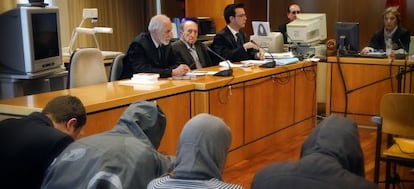Defense lawyer, 90, stuns court with anti-homeless rant
Attorney claims street sleeper "provoked" suspected neo-Nazis into attacking him

A trial involving four suspected neo-Nazis charged with violently assaulting a homeless man in 2009 this week became a soap box for xenophobic violence.
Ángel Pelluz, the defense lawyer for two of the accused, on Tuesday delivered a written statement that left the court open-mouthed: "Vagrancy is not recognized in our Magna Carta. The occupation of public space by someone who does not have a dignified existence is a cause of rejection in others that obey the law. Vagrancy, the desire to do nothing, the act of being a parasite on decency, gives rise to repulsion," the lawyer wrote.
On leaving court, Pelluz told the Europa Press news agency: "I've seen local residents moving cardboard and these people, with lice, to get into their homes. These are not humans. They have not worked in their life; they are a cancer on society. If I have cancer, the doctor wouldn't pussyfoot around; he'd cut it out, and this is the same."
Pelluz, 90, has been a lawyer for 61 years and later this week will undergo surgery for cancer. He is staging the defense of his two clients on a pro bono basis. Speaking to EL PAÍS, Pelluz reiterated his stance on Tuesday afternoon: "My clients didn't do anything, they were simply passers-by. What I want to say is that there was prior provocation, the presence of this person in the street. Nobody wants to walk down Gran Vía shoving shoeless people aside. Shit has always been collected."
These are not humans. They have not worked: they are a cancer on society"
Alluding to the dictatorship and its Layabouts and Crooks Law, he added: "Franco has been accused of many things, but he kept Spain in order. For me, a violent crime is being tried. But the NGO that filed the popular suit has politicized the matter, so I was forced to focus the case like this."
The NGO in question is the Movement Against Intolerance. Its president, Esteban Ibarra, calls homeless people "the silent victims. More than half have been attacked. The skinheads have never spoken of their hatred toward the homeless person; they cannot explain how they brutally beat a sleeping man."
The public prosecutor is seeking a 12-year term for one of the accused, Mykhailo Tsyku, and 10 years each for the other three, plus 300,000 in compensation for the victim, Rafael Santamaría, who was allegedly beaten by the accused on the night of August 23, 2009 as he slept in a photo booth in Madrid.
The attack left Santamaría in a coma. He was bedridden and unresponsive for 541 days and has never fully recovered. The head injuries he sustained prevent him from carrying out simple tasks by himself. In the view of the prosecutors, the four defendants acted in mutual agreement and with the intention to cause harm.
One of the four, Javier Royo Blasco, is a member of the far-right political party Alianza Nacional. At the time of the attack he was on parole after serving a sentence for a fight in his neighborhood. Royo, who admitted that he has a tattoo of the word "blood," blames the incident on Tsyku, a Ukrainian. Royo's statement claims that he left a bar that evening and heard cries. When he turned around, he saw Tsyku on top of Santamaría "punching him and stamping on him with a face full of rage."
Tsyku's version of events only confirms that he was there that night. He says he was walking down the road when a drunken homeless man insulted him. Tsyku says he feels sorry for the situation of homeless people in recession-riven Spain. "I don't hate anybody," he says. He also explains that his close-cropped hair is the result of dermatitis and denies belonging to a neo-Nazi group. "I couldn't. I'm a communist. My grandfather was killed in the war."
Tu suscripción se está usando en otro dispositivo
¿Quieres añadir otro usuario a tu suscripción?
Si continúas leyendo en este dispositivo, no se podrá leer en el otro.
FlechaTu suscripción se está usando en otro dispositivo y solo puedes acceder a EL PAÍS desde un dispositivo a la vez.
Si quieres compartir tu cuenta, cambia tu suscripción a la modalidad Premium, así podrás añadir otro usuario. Cada uno accederá con su propia cuenta de email, lo que os permitirá personalizar vuestra experiencia en EL PAÍS.
¿Tienes una suscripción de empresa? Accede aquí para contratar más cuentas.
En el caso de no saber quién está usando tu cuenta, te recomendamos cambiar tu contraseña aquí.
Si decides continuar compartiendo tu cuenta, este mensaje se mostrará en tu dispositivo y en el de la otra persona que está usando tu cuenta de forma indefinida, afectando a tu experiencia de lectura. Puedes consultar aquí los términos y condiciones de la suscripción digital.








































